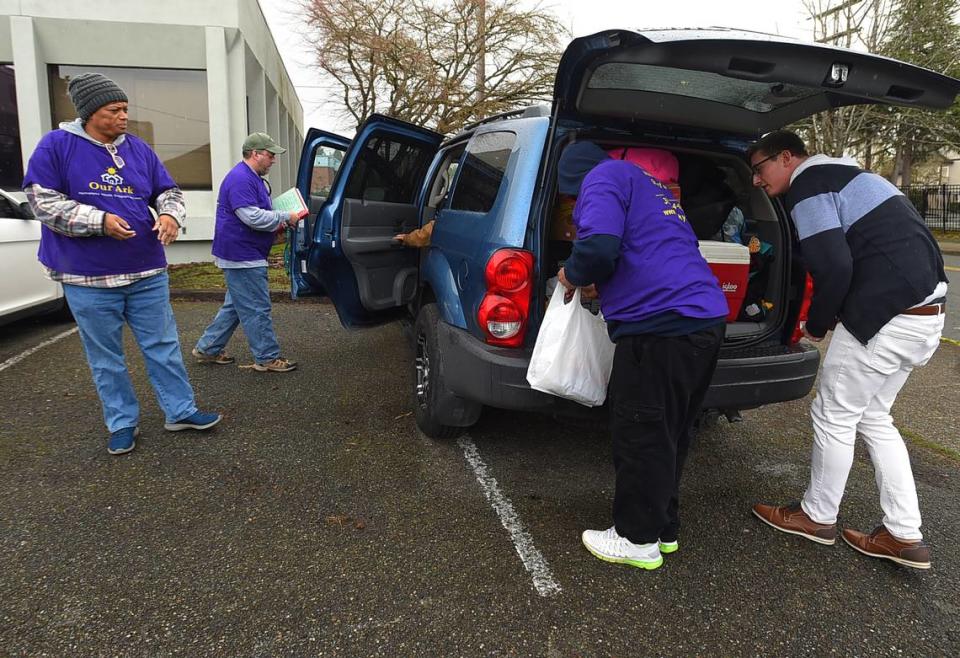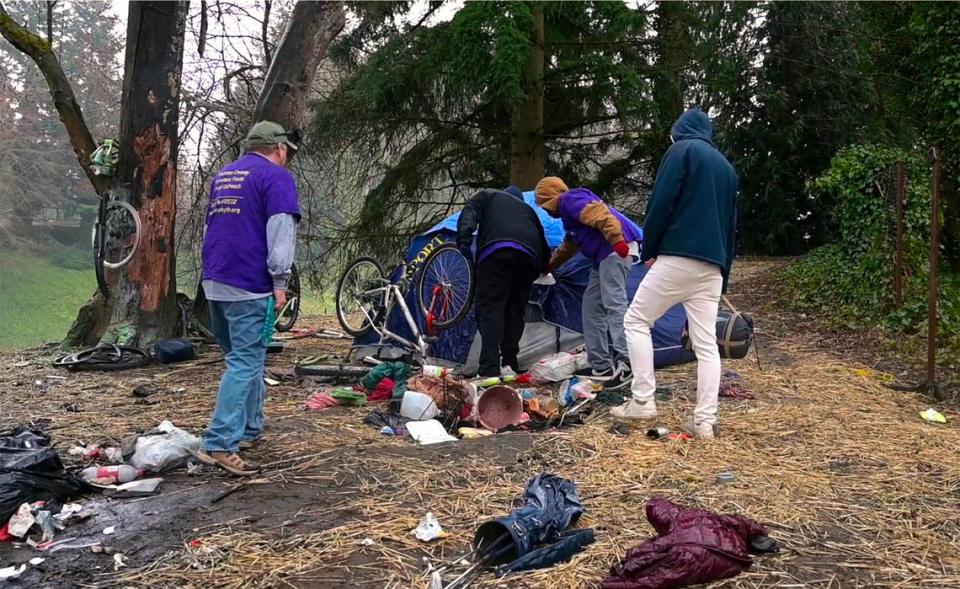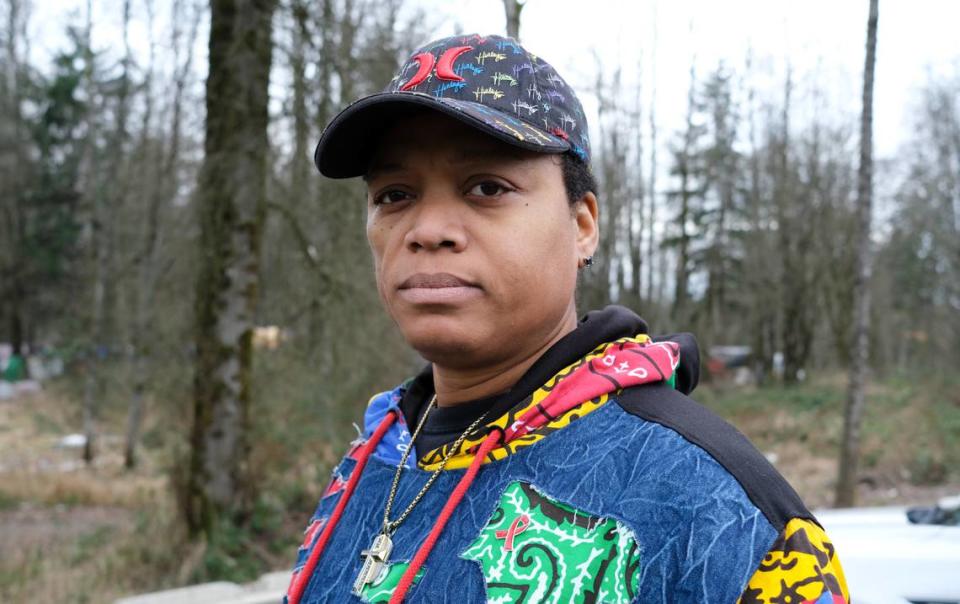This emergent non-profit is taking a different approach to helping homeless youth
Our Ark is not a typical homeless outreach organization. Danny Burkett founded the nonprofit two years ago specifically to help street kids between ages 13 and 25 that he felt were not being served well elsewhere.
“Our young people need to feel the love of home and to feel the love of caring and hope,” Burkett said. “So that’s what I want to bring towards them.”
His approach diverges from other organizations in the way he and his staff build relationships with youth. He favors creating closer, familial-like relationships that stretch the boundaries of what some others consider best practices.
He said his ultimate goal is to break the cycle of homelessness for street youth — those that live outside rather those with unstable housing — and turn them into productive citizens.
Prior to starting Our Ark, Burkett served in the Army for 16 years. He also previously served as the executive director of StandUp for Kids in Thurston County, another nonprofit that helps youth at risk of or experiencing homelessness.
He said his past experience informs his current methods. It’s an approach that has endeared him to many, but he also admits it has led to disagreements with others.
Burkett founded Our Ark in 2021. As of February, he said the organization has provided 196 instances of peer support, more than 5,100 meals, 30 nights of shelter and 3,115 hours of mentoring support.
He said he works with four staff members and six volunteers to conduct street outreach as well as offer mentoring and peer support. They strive to connect with youth about four days a week and be on call for them when they need urgent help.
“We want to be consistent to let them know that we’re still here,” Burkett said. “We didn’t go nowhere. Your parents may have left, your guardians may have left, you may have aged out of foster care, but I’m still here.”
What Our Ark does
On a Friday last month, Burkett parked his car by an encampment near Martin Way East and Ensign Road. He brought food and supplies for homeless youth. With him was Gingey Collis, 21.
Collis moved to Olympia from Shelton about three years ago. After being homeless for about a year, he started receiving aid from Our Ark.
“They’re more frequent and more consistent,” Collis said. “And they don’t just give food and supplies and then leave like the other groups do.”
Lilly Johnston, 17, said she’s been living on the streets in Olympia for two years. She said Burkett offers help that “nobody else will.” In turn, she helps him extend that help to others.
“I’m out here with all the kids, so if (Burkett) doesn’t know where somebody is, I will try to find them,” Johnston said. “With all the food packages that get dropped off, I make sure that they all get it.”
Each year, Burkett said he spends 45 continuous days walking the streets and the camps, looking for homeless youth. He spends five of those days sleeping in a tent.
“My goal is to find as many kids as possible and bring as many as I can into shelter,” Burkett said.
In doing that, he said he’s come across dozens of youth a day. After meeting them, he refers them to other nonprofits such as SafePlace, Northwest Resources and Community Youth Services.
On a typical day, Burkett said Our Ark connects with about 15 youth, but that number can vary. To create a deeper connection, Burkett said he and his staff do not shy away from giving hugs or saying, “I love you,” provided the youth consent to it first.
“What I do is completely and totally different from any other organization here in Thurston County,” Burkett said. “When we talk to kids, we talk to them like they are our own. … Our kids, they need direction, they need advice, they need structure.”
Structure may include teaching them time management skills or helping them create life goals, he said. But it also may involve “discipline,” as he put it.
As an example, he said youth who repeatedly disrespect him are not allowed to participate in recreational activities or events The Ark organizes until they apologize to him.
That said, misbehaving youth would not be cut off from Our Ark entirely. Burkett said he still offers them basics, such as water, food and clothing. He calls anything beyond that a privilege.
Those who do take part in recreational gatherings have gone bowling, enjoyed picnics and seen movies, among other activities, he said.
Additionally, Burkett said Our Ark orchestrates a food network of 10 volunteers who regularly prepare 15 home-cooked meals a week for the youth they serve.

A word on ‘best practices’
Keylee Marineau, Homeless Response Program Manager for Thurston County, shared her thoughts on best practices for serving homeless youth with The Olympian.
Prior to working at Thurston County, Marineau served as the director of services for high-risk youth at Community Youth Services, a well-established South Sound child welfare agency.
She declined to comment on Our Ark’s practices directly, and said the county has not worked with Burkett before.
Speaking generally, Marineau said she has seen passionate people arrive to help local homeless youth but ultimately failing. As examples, she said people may work overtime, invite youth into their homes, share their personal phone numbers with them or offer gifts.
“They get caught up in this rescuing kind of mode where they feel like, ‘Nobody else can do this but me,’” Marineau said. “If I start thinking that way, something’s wrong.”
These efforts are not always nefarious, but Marineau said they can be problematic. She said that setting such a precedent may ultimately lead to disappointment if there’s not enough for everyone, funding runs dry or the worker burns out.
She believes outreach workers should follow the principle of trauma-informed care, meaning they should understand how past trauma may influence a person’s actions.
“If I were to distill it down to one statement, it would be, ‘Every person is an expert in their own experience and the choices that they make are right for them at that time,’” Marineau said.
She said workers ought to reduce the chance for harm in their interactions and work to get people into housing as a first step towards stabilization.
Specific to youth is the three-part framework of Positive Youth Development, Marineau said. The U.S. Department of Health and Human Services defines PYD as a body of research that suggests positive influences can promote success and avoid issues.
First, Marineau said youth benefit from meaningful relationships, or genuine connections with caring adults that are consistent, rooted in trauma-informed care, and have strong professional boundaries.
Second, she said youth should meaningfully participate in their care, such as by being offered choices, as well as being compensated for their input.
The third principle is to hold high expectations for youth to find success rather than viewing them as needy. Marineau said this principle is rooted in the Pygmalion effect, where what you see is what you get.
The part about professional boundaries is the most important aspect because it could potentially be the most harmful if violated, she said. Workers in this field have “tremendous power” as gatekeepers to resources, she said.
“If I don’t stay in my lane, if I overpromise and under-deliver, if I start down the path of favoritism, whether advertently or inadvertently, I’m going to cause tremendous harm to that young person and destroy my relationship,’” Marineau said.
Marineau said workers cannot pretend to know what’s best for young people based on their own experience.
“I need to respect their autonomy and their agency,” Marineau said. “And not come from an ageist or adultism kind of perspective, knowing what’s best.”
Our Ark staff
Jesska Foster, 28, provides peer support and hosts an apartment in Lacey that offers temporary housing for homeless youth. She said the work Our Ark does saves young lives.
“You watch them go from like this dark gloominess to just this beautiful light,” Foster said. “You can just tell that they’re more confident. That’s what it’s about.”
Jermaine Peet, 28, conducts street outreach at local camps. He said that involves building relationships, checking up on previous contacts as well as offering resources and food when they can.
“Our Ark is a special one,” Peet said. “When we wear the purple shirts and we go out, they know that’s Our Ark. It’s a good program that stands out, that’s really fighting for something. What we fight for is for these kids.”
Peet started volunteering for Our Ark this year. Like the youth he helps, Peet said he’s homeless. Rather than that being a detriment, he said his experience allows him to better connect with youth.

Eddie Newsome, 36, started conducting outreach for Our Ark late last year. Prior to that, he had been homeless himself. Now, he works as a cook in downtown Olympia and has his own apartment.
Like Peet, his experience helps him relate to those Our Ark helps. He described Burkett as a man who’s wholly devoted to a good cause.
“It’s a really harsh environment,” Newsome said. “It’s not your ideal place to lay your head. (Burkett) is feet on the ground. He’s going up to kids, shaking hands, talking to them.”
Being on the ground helps humanize homeless youth in a way that the average passersby may not appreciate, Newsome and Peet said.
“I think people judge a lot and don’t give a person the time of day,” Newsome said. “I think there could be more done if the community helped out.”
When asked how he selects his staff, Burkett said he conducts extensive interviews and requests background checks from Washington State Patrol. He said his staff are then trained to offer peer counseling and conduct outreach.
“All of our staff or volunteers, they all have lived experiences whether that be substance abuse or mental health issues which is all managed already,” Burkett said. “We do the best we can as far as background checks and going through training.”
He said he would terminate anyone who acted inappropriately with the youth he serves.
Others weigh in
Avalon Kragness, business director at Olympia Lamplighters, started hosting food and donation events for Our Ark at their downtown location about two years ago. She called Burkett a genuine and caring person.
“He truly goes the extra mile for any of his kids that he deals with,” Kragness said. “He’s so positive and so helpful to literally anybody that he’s interacting with.”
Steven Stalker became a program director at Innovations Human Trafficking Collaborative, a local non-profit that helps people affected by human trafficking, in 2022. He said Burkett sometimes connects Innovations with young adults that are suspected or allegedly trafficked.
“Danny (Burkett) has a great rapport with the youth and young adults he serves,” Stalker said. “I can see it regularly because they run up and give him a hug whenever he’s out of town for a couple of weeks.”
Stalker previously worked as a probation officer for the Washington State Department of Corrections. In that role, he supervised some young adults who Burkett helped.
Though some may disagree with his methods, Stalker said Burkett offers a level of persistence and consistency that others may not.
“What I see Danny (Burkett) doing is developing those intangibles,” Stalker said. “He’s developing their self-confidence and self-worth and self-esteem. He’s taking the time to actually get to know these individuals.”

Looking ahead
Our Ark is funded by local donations and grants. Burkett said he prefers those over government grants that often carry extra restrictions or bureaucratic requirements.
For now, Burkett said he has been blessed with enough funding to continue his work. He opened an office for Our Ark last month at 824 Fifth Ave. SE in Olympia. He envisions turning the space into a welcoming resource hub for street youth.
Looking further ahead, Burkett said he hopes to create a home for homeless youth. This home would be managed by what he called “street parents,” outreach workers with the parental skills to care for and guide them.
“The future for Our Ark is to create ‘safe haven’ that feels like home,” Burkett said. “Not a building, not a group home, just a home.”

